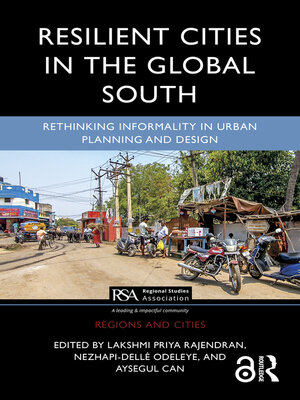Resilient Cities in the Global South
ebook ∣ Rethinking Informality in Urban Planning and Design · Regions and Cities
By Lakshmi Priya Rajendran

Sign up to save your library
With an OverDrive account, you can save your favorite libraries for at-a-glance information about availability. Find out more about OverDrive accounts.
Find this title in Libby, the library reading app by OverDrive.



Search for a digital library with this title
Title found at these libraries:
| Library Name | Distance |
|---|---|
| Loading... |
Post-pandemic, cities face new challenges in adapting to global changes, while also addressing the needs, practices, and capabilities of diverse populations. Resilience, as a key factor, enables cities to adapt and transform in response to these challenges. Development driven by resilience is crucial for urban society's ability to adapt and evolve on multiple levels. However, in developed countries, increasingly standardised planning and development practices often hinder citizen engagement and participation, which are essential for building resilient cities.
This book adopts an interdisciplinary approach to examine how diverse social and spatial behaviours within informal urban environments, particularly in developing countries, can provide fresh insights for robust urban planning and development.
The book is structured in three parts: (1) North–South Relations – this part explores the global discourse on informality, highlighting its presence in both the Global North and South; (2) Grassroots – this part focusses on grassroots initiatives and community-driven resilience within urban informality; and (3) Institutional Strategies and Professional Alliances – the final part delves into the role of institutions and professional collaborations in shaping urban informality.
By presenting a range of perspectives and experiences, this book contributes to a unique Southern framework that positions informality as a dialogue for enabling resilience. It will appeal to a multidisciplinary audience, including professionals from fields such as sociology, history, environmental psychology, cultural studies, human geography, urban design and planning, architecture, and anthropology.
The Open Access version of this book, available at www.taylorfrancis.com, has been made available under a Creative Commons Attribution-Non Commercial-No Derivatives (CC-BY-NC-ND) 4.0 International license.







